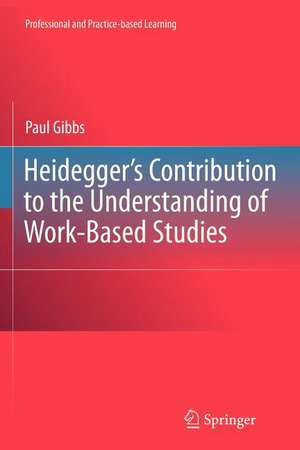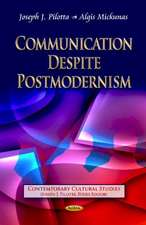Heidegger’s Contribution to the Understanding of Work-Based Studies: Professional and Practice-based Learning, cartea 4
Autor Paul Gibbsen Limba Engleză Paperback – dec 2012
| Toate formatele și edițiile | Preț | Express |
|---|---|---|
| Paperback (1) | 635.31 lei 6-8 săpt. | |
| SPRINGER NETHERLANDS – dec 2012 | 635.31 lei 6-8 săpt. | |
| Hardback (1) | 641.53 lei 6-8 săpt. | |
| SPRINGER NETHERLANDS – 6 oct 2010 | 641.53 lei 6-8 săpt. |
Din seria Professional and Practice-based Learning
- 18%
 Preț: 887.24 lei
Preț: 887.24 lei - 18%
 Preț: 891.48 lei
Preț: 891.48 lei - 18%
 Preț: 950.52 lei
Preț: 950.52 lei - 18%
 Preț: 950.03 lei
Preț: 950.03 lei - 18%
 Preț: 1112.30 lei
Preț: 1112.30 lei - 24%
 Preț: 835.99 lei
Preț: 835.99 lei - 15%
 Preț: 641.85 lei
Preț: 641.85 lei -
 Preț: 394.87 lei
Preț: 394.87 lei - 15%
 Preț: 651.19 lei
Preț: 651.19 lei -
 Preț: 394.51 lei
Preț: 394.51 lei - 18%
 Preț: 1240.30 lei
Preț: 1240.30 lei - 15%
 Preț: 651.84 lei
Preț: 651.84 lei - 15%
 Preț: 649.39 lei
Preț: 649.39 lei - 15%
 Preț: 700.75 lei
Preț: 700.75 lei - 18%
 Preț: 733.96 lei
Preț: 733.96 lei - 15%
 Preț: 648.89 lei
Preț: 648.89 lei - 18%
 Preț: 943.57 lei
Preț: 943.57 lei - 18%
 Preț: 1014.89 lei
Preț: 1014.89 lei - 18%
 Preț: 784.61 lei
Preț: 784.61 lei -
 Preț: 391.22 lei
Preț: 391.22 lei - 15%
 Preț: 647.08 lei
Preț: 647.08 lei - 15%
 Preț: 700.29 lei
Preț: 700.29 lei - 15%
 Preț: 652.64 lei
Preț: 652.64 lei - 18%
 Preț: 886.62 lei
Preț: 886.62 lei - 15%
 Preț: 637.28 lei
Preț: 637.28 lei - 18%
 Preț: 946.41 lei
Preț: 946.41 lei - 18%
 Preț: 939.33 lei
Preț: 939.33 lei - 24%
 Preț: 864.86 lei
Preț: 864.86 lei - 18%
 Preț: 960.78 lei
Preț: 960.78 lei
Preț: 635.31 lei
Preț vechi: 747.43 lei
-15% Nou
Puncte Express: 953
Preț estimativ în valută:
121.56€ • 126.92$ • 100.61£
121.56€ • 126.92$ • 100.61£
Carte tipărită la comandă
Livrare economică 05-19 aprilie
Preluare comenzi: 021 569.72.76
Specificații
ISBN-13: 9789400733626
ISBN-10: 9400733623
Pagini: 192
Ilustrații: XVI, 176 p.
Dimensiuni: 155 x 235 x 10 mm
Greutate: 0.28 kg
Ediția:2011
Editura: SPRINGER NETHERLANDS
Colecția Springer
Seria Professional and Practice-based Learning
Locul publicării:Dordrecht, Netherlands
ISBN-10: 9400733623
Pagini: 192
Ilustrații: XVI, 176 p.
Dimensiuni: 155 x 235 x 10 mm
Greutate: 0.28 kg
Ediția:2011
Editura: SPRINGER NETHERLANDS
Colecția Springer
Seria Professional and Practice-based Learning
Locul publicării:Dordrecht, Netherlands
Public țintă
ResearchCuprins
Introduction.- Part I: Context.- Chapter 1 Work-Based Learning as a Field of Study.- Chapter 2 Learning as Knowledge of Being-in-the-World.- Chapter 3 Dwelling at Work.- Chapter 4 What is work? A Heideggerian Insight into Work as a Site for Learning.- Chapter 5 Heidegger; Time, Work and the Challenges for University Lead Work-Based Learning.- Part II—ISSUES IN WORK-BASED STUDIES.- Chapter 6 Quality in Work-Based Studies: Not Lost, Merely Undiscovered.- Chapter 7 Assessment and Recognition of Work-Based Learning.- Chapter 8 Learning Agreement—Entitlements and Evidence in Work-Based Learning.- Chapter 9 A Heideggerian Phenomenology Approach to Higher Education as Workplace: A Consideration of Academic Professionalism.- Chapter 10 Adopting Consumer Time: Potential Issues for Higher Level Work-Based Learning.- Chapter 11 The Concept of Boredom: Its Impact on Work-Based Learning.- Chapter 12 Practical Wisdom and the Workplace Researcher.- Chapter 13 The Recession and the World of Work-Based Studies.- Index.
Textul de pe ultima copertă
This book seeks to develop the philosophy of Heidegger notion and reflects the growing importance of work based studies which is becoming of special interest to higher education institutions and commercial organisations. The author acknowledges the dominance of the economic discourse of higher education, but in this book he tries to argue that Heidegger offers a phenomenological approach to understanding the diversity to higher education that work based learning can bring. The book offers a structured argument for a phenomenological understanding of both the educational institution and the commercial environment to be considered as workplaces.
Caracteristici
First volume to show through the works of Heidegger that work based studies although potentially a form of machination need not be so Argues that constraining belief and knowledge to the known or knowable within an ideology of consumerism is restricting one of the key functions that a university as a centre for work based learning can contribute to society Timely as arguments for access and the provision of work related studies dominate discussion of higher education
















